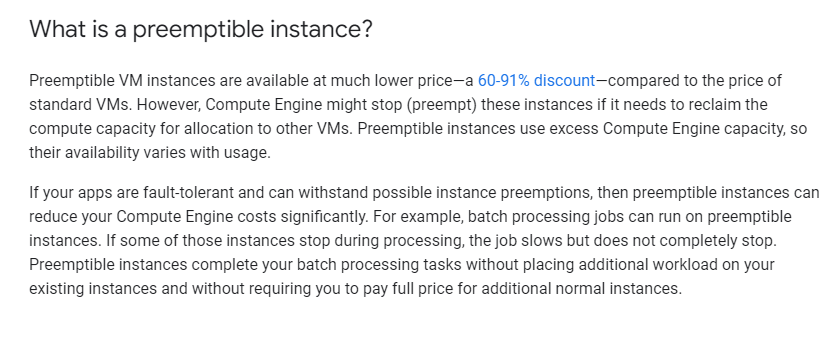Google Cloud Digital Leader Exam Practice Test
A customer of yours has an SLA with their client that a particular service will respond within 4 sec-onds. The end client has reported that it feels slower. Your engineers do a trial at the client site and notice that there seems to be a delay for many of the requests. It's your team's responsibility to iden-tify the issue quickly within the strict timeline for fixes according to the contract, and then fix it. What should you do?
Answer : D
Cloud Trace is a built-in tool in the Operations suite to identify issues like latency.
->Such fixes are unlikely to change core issues like the service itself being architected or written sub-optimally. Though changes like browser, networking, etc. are helpful, it would be the wrong approach to first recommend that the customer upgrade all their hardware and software.
->Rewriting code and logging information is going to be time consuming. In general though, logging should always be included in code and it can give good insights. But tracing is way more specific and comprehensive for this requirement.
->In certain cases, we might identify scaling as the issue. But we should first identify the core problem. So, start with tracing. We can also achieve scale in server-ful technologies.
Reference link-https://cloud.google.com/trace
An organization has migrated several large databases to the cloud. It wants to increase the value of its data, improve cost controls and strengthen regulatory compliance. What should the organization do?
Answer : B
An effective data governance program helps organizations manage data quality, privacy, and security, ensuring compliance with regulations and optimizing the value derived from data. This approach involves defining policies and procedures for data access, usage, and retention, which improves cost control and strengthens regulatory compliance.
Option B: Establish an effective data governance program is correct because it provides a comprehensive framework for managing data, optimizing value, controlling costs, and ensuring compliance.
Google Cloud: Data Governance and Compliance Solutions
Google Cloud Data Management: Best Practices for Data Governance
The operating systems of some of your organization's virtual machines may have a security vulnerability.
How can your organization most effectively identify all virtual machines that do not have the latest security update?
Answer : A
Security Health Analytics and Web Security Scanner detectors generate vulnerabilities findings that are available in Security Command Center. Your ability to view and edit findings is determined by the Identity and Access Management (IAM) roles and permissions you are assigned. For more information about IAM roles in Security Command Center.
Reference link:-
https://cloud.google.com/security-command-center/docs/concepts-vulnerabilities-findings
structured data?
Answer : D
Unstructured data refers to data that does not have a pre-defined data model or schema. Examples include text, images, audio, and video files. Call center transcripts are unstructured data because they are composed of free-form text, which does not follow a specific schema or structure.
Option D: Call center transcripts is correct because it represents unstructured data, as opposed to structured data like customer orders or product ratings.
Google Cloud: Understanding Unstructured Data
Google Cloud Storage Solutions: Managing Unstructured Data
A Multiple projects within your organization have long-term VM usage. Based on current demand, they are able to project into the future and estimate how many VM hours they will use every year. Going in for a committed use contract seems sensible. How can you configure committed use easily across all the projects?
Answer : A
Explanation
Enable committed use discounts are applied to the project from which you purchased it. To share the discount across multiple projects linked to your Cloud Billing account, enable committed use discount sharing from the console. When you enable committed use discount sharing, all of your current active committed use dis-counts in all the projects under the same Cloud Billing account, including those you previously purchased and new ones you purchase in the future are shared across your Cloud Billing account. Your sustained use discounts are also pooled and shared across all projects within your Cloud Billing account.
You are a program manager within a Software as a Service (SaaS) company that offers rendering software for animation studios. Your team needs the ability to allow scenes to be scheduled at will and to be interrupted at any time to restart later. Any individual scene rendering takes less than 12 hours to complete, and there is no service-level agreement (SLA) for the completion time for all scenes. Results will be stored in a global Cloud Storage bucket. The compute resources are not bound to any single geographical location. This software needs to run on Google Cloud in a cost-optimized way.
What should you do?
In Google Cloud IAM: if a policy applied at the project level gives you Owner permissions, your access to an individual resource in that project might be restricted to View permission if someone applies a more restrictive policy directly to that resource. What is correct below the options
Answer : A
Policies are a union of those applied to resources themselves and those inherited from higher levels in the hierarchy. If a parent policy is less restrictive, it overrides a more restrictive policy applied to the resource. If a parent policy is more restrictive, it does not override a less restrictive policy applied to the resource. Therefore, access granted at a higher level in the hierarchy cannot be taken away by policies applied at a lower level in the hierarchy.
